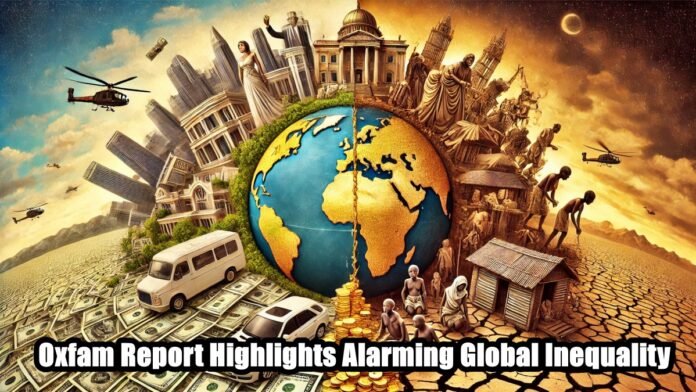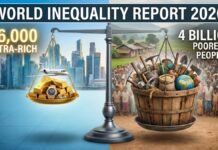
Key Points:
- Wealth Surge: Billionaire wealth surged threefold in 2024, increasing from $2,000 billion to $15,000 billion globally.
- 204 New Billionaires: On average, four billionaires were added weekly in 2024, bringing the total to 2,769 worldwide.
- Asia’s Contribution: Asia alone contributed $299 billion to the total wealth increase, adding 41 new billionaires.
- Inherited Wealth Dominates: 60% of billionaire wealth comes from inheritance, monopolies, or collusion.
- Global North Dominance: Countries like the U.S. and U.K. hold 69% of global wealth while representing only 21% of the population.
- Call for Higher Taxes: Oxfam urges governments to tax the wealthiest to curb inequality and fund essential public services.
- Stagnant Poverty Rates: No significant reduction in global poverty since 1990; billions still live on less than $6.85/day.
New Delhi: The global wealth divide has reached alarming levels, according to Oxfam International’s latest report, “Takers, Not Makers,” released ahead of the World Economic Forum (WEF) in Davos. The report highlights an unprecedented surge in billionaire wealth and the stagnation of poverty reduction, signaling the urgent need for economic reforms to address inequality.
Billionaires Thrive, Poverty Persists
Oxfam’s report reveals that global billionaire wealth tripled in 2024, growing from $2,000 billion to $15,000 billion, with 204 new billionaires joining the list. This reflects an average daily increase of $5.7 billion, as the total number of billionaires rose to 2,769 from 2,565 in 2023.
The 10 wealthiest individuals alone saw their wealth grow by $100 million per day. Even if these billionaires lost 99% of their fortunes overnight, they would still remain among the richest.
Meanwhile, poverty rates have shown little improvement since 1990. Billions of people continue to survive on less than $6.85 a day, with no significant reduction in the absolute number of impoverished individuals globally.
Asia’s Role and Global North Dominance
The report highlights Asia’s significant contribution to the billionaire boom, adding $299 billion in 2024 and 41 new billionaires. However, the lion’s share of wealth is concentrated in the Global North, with nations like the U.S., U.K., and France controlling 69% of global wealth and 77% of billionaire assets, despite accounting for just 21% of the world’s population.
“The richest one percent of the Global North countries earned $30 million per hour from the Global South’s financial systems in 2023,” the report states, illustrating a stark imbalance in wealth distribution.
Inherited Wealth and Economic Control
The study underscores that 60% of billionaire wealth comes from inheritance, monopolistic practices, or collusive relationships. Amitabh Behar, Executive Director of Oxfam International, warns that this growing concentration of wealth is creating a “new aristocracy” that threatens economic fairness and social justice.
“The power and influence of a few individuals over the global economy have reached unimaginable levels,” Behar said, adding that unchecked billionaire wealth accumulation will soon lead to the emergence of the world’s first trillionaires.
Impact on Public Services
Oxfam’s report criticizes the diversion of wealth into billionaire bank accounts while public services suffer from underfunding. “Money urgently needed for teachers, medicines, and good jobs is being hoarded by the super-rich,” Behar emphasized, calling the trend not just economically damaging but also inhumane.
A Call for Action
The rights group has urged governments worldwide to:
- Implement higher taxes on the ultra-rich to reduce inequality.
- End excessive wealth accumulation by addressing monopolies and unfair financial practices.
- Reallocate resources to fund public services and reduce poverty.
A Warning to Humanity
Oxfam’s report serves as a stark reminder of the widening gap between the rich and the poor. With 36% of billionaire wealth now inherited, the study paints a grim picture of inequality entrenched by structural injustices.
The findings challenge world leaders gathering at the WEF to take decisive action to curb the concentration of wealth and prioritize investments in people and communities. As Behar aptly concluded, “This level of inequality is not just bad for the economy; it’s bad for humanity.”












































